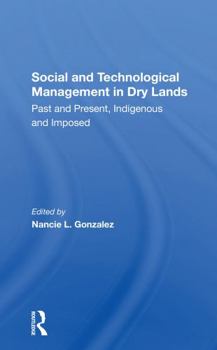Socialtechnological Man
Select Format
Select Condition 
Book Overview
Recent international attention has focused on desertification and its concomitants, especially the diminution of flora and fauna in arid and semiarid lands and the resulting reduction in the economic value of those lands. Natural factors such as drought and wind erosion, as well as various technological practices, have been blamed for the present situation in many countries. Most observers agree that human beings have been both perpetrators and victims of desertification. Anthropologists have long been interested in documenting hew different societies have affected and been affected by their environments. The papers in this volume present ease studies of societies ranging from ancient Peru to contemporary Israel, along with several topically oriented works. All are designed to illustrate how various societies--whether by water management or by the exploitation of plants and animals--have attempted to achieve ecological balance. Social organization and ideology as well as technology are discussed as important variables affecting the ways in which populations adapt to, or cope with, desertification.





